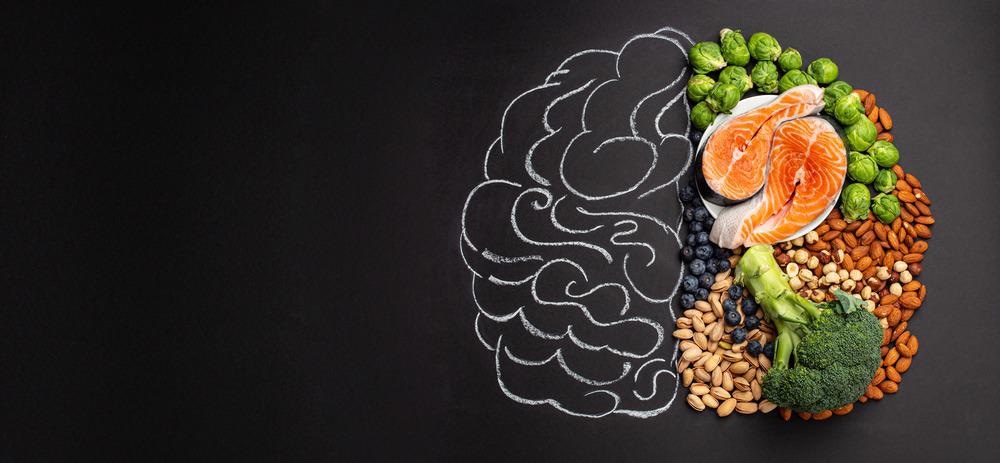The gut and brain and intimately linked, new research has found. Neurons line the gastrointestinal tract, suggesting that the brain and gut talk to each other, and, importantly, that one can affect the other.

Image Credit: Julia Mikhaylova/Shutterstock.com
We know that stress and worry, feelings thought to arise in the brain as a response to the cognitive processing of information, can lead to physical symptoms outside of the brain. The gut, more often than not, is linked with feelings of stress. Stomach aches and nausea are commonly felt alongside the cognitive factors of stress.
Scientists are now exploring the relationship between the gut and the brain, and the initial evidence shows that what we put into our gut can have a significant impact on our brains. The field of nutritional psychology has emerged out of this groundbreaking evidence, a new sector that straddles psychology and medicine, based on the assumption that food can be used to treat psychological disorders.
The development of this field may open up vital new therapeutic approaches to treating mental health and neurological disorders.
Food and mental health
The link between nutrition and mental health is becoming ever more apparent. Numerous studies have found strong correlations between diet and various aspects of mental health. For example, many studies have associated diets rich in fresh fruit and vegetables with higher levels of happiness and a sense of well-being.
The Mediterranean diet, in particular, has frequently been linked with a reduced incidence of depression due to its anti-inflammatory effect on the brain. Scientists have found those who consume the Mediterranean diet experience lower levels of depression and anxiety, whereas those who eat diets high in processed foods are at greater risk of developing these mental disorders.
Research has begun to focus on the specific nutrients and vitamins contained within certain foods to discover how they influence the brain and human psychology. Recently, folate, iron, long-chain omega-3 fatty acids (EPA, DHA), magnesium, potassium, selenium, thiamine, vitamin A, vitamin B6, vitamin B12, vitamin C, and zinc were identified by a team of Canadian researchers as vitamins and nutrients with antidepressant properties.
Following this, the team investigated the foods most dense with these antidepressant vitamins and nutrients and concluded that watercress, spinach, mustard/turnip/beet greens, lettuces (red, green, romaine), swiss chard, fresh herbs (cilantro, basil, or parsley), chicory greens, pummelo, peppers (bell, serrano, or jalapeno), and kale or collards were the top 10 (in descending order) in terms of the levels of antidepressant nutrients they contained.
Depression and anxiety aren’t the only mental health issues that diet has been shown to influence. Research has explored the impact of diet on a range of conditions. The ketogenic diet, for instance, may have a therapeutic effect on those with autism spectrum disorders (ASD). There is also some preliminary evidence that certain vitamin and mineral supplements may have the potential to be leveraged into a therapeutic option to reduce psychiatric symptoms in some people with schizophrenia.

Image Credit: Elena Eryomenko/Shutterstock.com
Food and neurotransmitters
There is a growing body of evidence to say diet can influence a wide range of disorders that are primarily associated with the brain. The question remains as to how food can influence this organ. Initially, the connection between food and the brain is not instantly clear. However, the fact that the intestinal tract is lined with neurons hints at the innate connection between the brain and the gut, suggesting that food can influence the workings of the brain, manifested in the impact of diet on mental health.
While the exact nature of this relationship is not fully understood, scientists theorize that the role played by vitamins and minerals as cofactors to numerous enzymes is at the root of it. There is a wealth of evidence to demonstrate that neurotransmitters are implicated in the development and progression of mental health illnesses and conditions. Enzymes are required for the numerous metabolic steps that are involved in neurotransmitter synthesis, therefore, food can influence the synthesis of neurotransmitters by acting as the initial input for the chain of processes required to synthesize neurotransmitters.
In addition to playing a vital role in neurotransmitter synthesis, food also has a well-documented anti-inflammatory effect on the brain. Inflammation has become increasingly implicated in a wide range of diseases, from cancer to depression. Chronic inflammation of the brain has been linked with many mental health illnesses. Avocados, bell peppers, berries, cruciferous vegetables such as broccoli, fish high in omega-3 fatty acids such as salmon, green tea, mushrooms, turmeric, tomatoes, and dark chocolate are just some foods that have been identified as having an anti-inflammatory effect. Consumption of such foods may reduce chronic inflammation and help alleviate conditions associated with such inflammation.
Education on the links between diet and its impact on the brain will likely be an important preventative measure to protect people from mental health illnesses as well as brain diseases and other diseases.
Sources:
- Adan, R., van der Beek, E., Buitelaar, J., Cryan, J., Hebebrand, J., Higgs, S., Schellekens, H. and Dickson, S., 2019. Nutritional psychiatry: Towards improving mental health by what you eat. European Neuropsychopharmacology, 29(12), pp.1321-1332. https://www.sciencedirect.com/science/article/pii/S0924977X19317237
- Firth, J., Stubbs, B., Sarris, J., Rosenbaum, S., Teasdale, S., Berk, M. and Yung, A., 2017. The effects of vitamin and mineral supplementation on symptoms of schizophrenia: a systematic review and meta-analysis. Psychological Medicine, 47(9), pp.1515-1527. www.cambridge.org/.../3CFE6C3B0FED2ED04B9968AD2660EA08
- Napoli, E., Dueñas, N. and Giulivi, C., 2014. Potential Therapeutic Use of the Ketogenic Diet in Autism Spectrum Disorders. Frontiers in Pediatrics, 2. https://www.frontiersin.org/articles/10.3389/fped.2014.00069/full
Further Reading
Last Updated: Mar 31, 2022